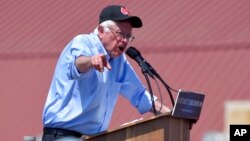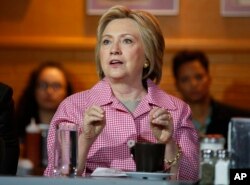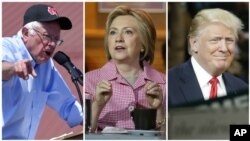Campaigning Saturday in Bakersfield, California, Democratic presidential candidate Bernie Sanders sent a large and wildly enthusiastic crowd into a tizzy just minutes into his remarks when he said, “If I’m elected president, I promise you …”
Attendees howled over Sanders’ choice of one particular word. The candidate paused, relishing the moment.
“Alright, when I’m elected president,” Sanders continued to thunderous applause and shouts of approval. “When the people of this country have a president who is going to fight for them, workers are not going to be working in the fields for starvation wages, that I assure you.”
How Sanders ultimately channels the passions and expectations of his supporters is an open question for Democrats in the final weeks of a hard fought, and at times, acrimonious primary contest between the Vermont senator and Hillary Clinton, a former secretary of state.
The acrimony can’t be missed on social media.
Fiery tweets
A Sanders supporter recently tweeted that “#CorporateFascist uber-hawk Clinton” is “[Republican Senator] John McCain with a uterus” and that “Everyone knows Hillary is a pathological liar. The problem is, her supporters don’t give a crap.”
Days ago, a Clinton supporter tweeted, “Okay @BernieSanders: we’ve had it with your bull----. Go home old man. #BernedOut.”
“I’ve certainly seen it [insults] all over Twitter. That’s where it’s the nastiest,” said Frank Anderson, executive director of the Fairfax County Democratic Committee in the presidential battleground state of Virginia.
“I don’t think it’s productive at all,” Anderson added.
While pundits say front-runner Clinton has an all but insurmountable delegate lead, Sanders insists the battle is not over, and that a strong showing in California and five other states next Tuesday would generate “momentum” for his campaign heading into the Democratic National Convention in July.
Even so, in recent campaign stops the Independent senator-turned Democratic presidential contender has omitted his most pointed attacks against Clinton that caused some Democratic leaders to fret openly about the party’s ability to unite for the November election.
In April, Sanders said he doubted Clinton is “qualified” to be president, given her initial support for the Iraq War, her backing of trade deals, and her ties to corporate America.
“Our job is to take on Wall Street, not to take their money,” he said at a campaign stop weeks ago.
Common goal
By contrast, at rallies over this past weekend, Sanders didn’t mention Clinton except to say they have a common goal: defeating Republican Donald Trump.
On Sunday, when asked about last week’s State Department inspector general report that Clinton’s email use as secretary of state violated agency procedure, Sanders refrained from attacking Clinton, saying it was a matter for “the American people, Democrats, and delegates” to examine.
“For me, right now I continue to focus on how we can rebuild a disappearing middle class,” he said on CBS’ Face the Nation program.
Clinton, meanwhile, has focused her firepower on Trump, questioning his qualifications to be commander-in-chief and highlighting revelations stemming from a lawsuit alleging fraud at a university bearing the Republican candidate's name.
While stressing that Trump must be defeated, Sanders has said little about achieving party unity at the Democratic National Convention. Many of his most vocal supporters, however, reject the possibility of unity if Clinton is the nominee.
“HRC is a TRAIN WRECK candidate that we WILL NOT VOTE FOR ... #BernieOrBust,” a Sanders backer tweeted. Others have said, if Sanders is not on the ballot in November, they would vote for the Green Party or even Trump before they vote for Clinton.
“Sanders has spent a year convincing progressives, independents, and Democrats that Clinton is not the person they should want to be president, and as long as his messaging continues some of his supporters will not budge,” said political analyst John Hudak of the Brookings Institution. “The same phenomenon happened in 2008 as Clinton continued her battle with then-Senator Obama.”
Divisive politics
Anderson said fissures among Democrats seem worse today.
“In 2008, you had a broader coalition of people supporting both candidates [Obama and Clinton],” he said. “Right now it’s more clearly divided between the really liberal [Sanders supporters] and the somewhat liberal [Clinton supporters]. The battle lines are more clearly drawn.”
In 2008, some Clinton supporters said they would never vote for Obama, calling themselves PUMAs, which stood for “Party Unity My A--”. Those divisions all but melted away, though, after Clinton endorsed Obama at the end of the primary season, and Obama went on to a decisive victory over Republican John McCain.
Hudak expects a similar dynamic this year.
“The rift between the Sanders and Clinton campaigns may look like a threat to Democratic Party unity and to the Democratic ticket in November, but the type of anger and refusal to vote for Clinton among some Sanders supporters is politics as usual in a competitive primary,” he said.
“At the end of the day, many—not all, but likely enough—Sanders supporters will come, even if begrudgingly, into the Clinton camp,” Hudak added. “Sanders will endorse Clinton and even if he isn’t the ardent campaigner that she was in 2008 on Obama’s behalf, his message will be clear: Democrats and progressives don’t have any choice but Clinton.”
The ‘Bernie or bust’ movement does not extend to the advocacy groups backing the Vermont senator.
“We have two [Democratic] candidates running for president that have a vastly superior environmental record than the Republican nominee, Donald Trump,” said Erich Pica, president of the pro-environmental organization Friends of the Earth Action, which endorsed Sanders last year.
“The people who are supporting Bernie Sanders for president believe in something that is wholeheartedly different than what Donald Trump believes in. If Secretary Clinton wins the nomination, voting for Donald Trump in that situation would be essentially voting against everything Senator Sanders represents and has been campaigning on,” Pica added.
Fears of disengagement
Some observers see another possibility: that millions of young progressives energized by Sanders simply might stay at home on election day rather than vote for Clinton or Trump.
“I should hope that it doesn’t come to that,” Anderson said. “There are a number of new people coming to the [democratic] process. It’s a risk that they become disengaged.”
But Hudak sees a counterveiling force to motivate Democrats and progressives of all ages: the possibility of a Trump presidency.
“Time heals all wounds, and for miffed Sanders supporters, Trump will act as a political Neosporin [antibiotic cream],” he said.
“Pundits seem to wildly underestimate the outsized role and impact President Obama will have in the general election. His impassioned support of Clinton and proven-campaign trail prowess will help bring Sanders voters to vote for Clinton. In all cases, the 'anyone-but-Trump' messaging from Democrats will be too convincing for most progressives to reject,” Hudak added.
For now, however, emotions run high in both the Sanders and Clinton camps.
On Wednesday, a Sanders supporter tweeted, “I’ll stop fighting for my candidate when he stops fighting for me.”
Hours earlier, a Clinton supporter tweeted, “Next week, America will see it's first female nominee within a major party. RT [retweet] if you're proud to say #ImWithHer!”



